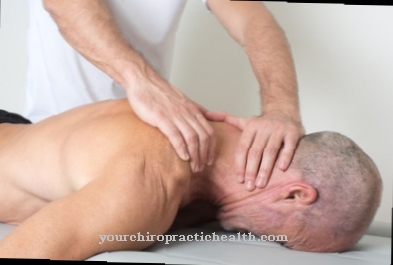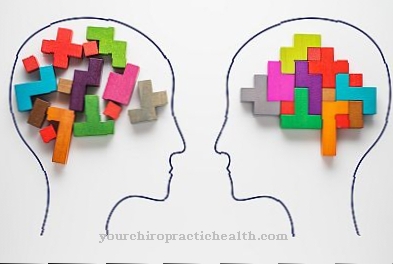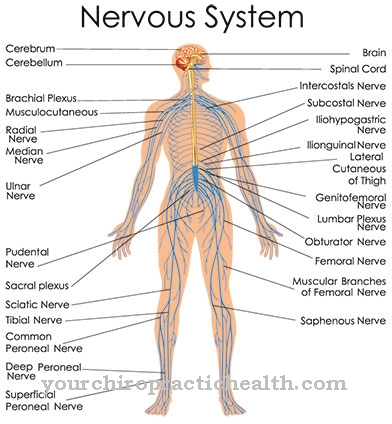Under one unconsciousness or Faint is to be understood as a strong disturbance of the consciousness of a person, in which the person is no longer able to communicate and does not react in any other way to his immediate environment.
What is unconsciousness?

Loss of consciousness is a common phenomenon. Every day people suddenly wake up on the floor and cannot remember the fall or the impact. Unconsciousness usually occurs very suddenly and can affect both men and women - it doesn't even stop at children.
Unconsciousness, which is also called syncope in technical jargon, usually leaves those affected, as well as observers and first aiders, with a great shock, as the sudden "blackout" cannot be properly classified. Approximately 20% of all people experience loss of consciousness at least once in their life. So it is all the better to know how to behave in such a case and how to prevent fainting. Take care of yourself after you lose consciousness. But how do you recognize unconsciousness?
This includes, for example, that the unconscious person does not react to another person being spoken to because he is no longer able to show orientation about space and time. But not only the communicative ability of the unconscious is massively restricted, but he also shows no reactions to stimuli, so that neither feelings nor pain are to be expected.
In medicine, different degrees of severity are distinguished with regard to unconsciousness. These range from slight fainting to apparent death.
causes
Loss of consciousness can have different causes. It is not uncommon for there to be complexes of causes, which means that several causes work together and lead to a disturbance of consciousness. Loss of consciousness occurs when the brain is no longer adequately supplied with oxygen and blood. It can appear suddenly and unprepared, but in many cases it announces itself through loss of orientation or dizziness.
The frequency of unconsciousness also differs from person to person. The reasons why the brain can no longer be adequately supplied are numerous. Neurological disorders, such as a nervous system disorder, are the trigger in approximately 10% of cases. In 20% it has physical causes, such as a lack of oxygen or hypoglycaemia. 30% are triggered by disorders of the cardiovascular system. In almost 40% of cases, however, the cause cannot be clarified. In the event of fainting, a doctor should therefore be consulted immediately. Although unconsciousness is usually harmless, in some cases it can also be life-threatening. Never underestimate unconsciousness.
The fact is, however, that the main cause can be traced back to a disturbance in the central nervous system. Both circulatory disorders or bleeding within the brain can be responsible for this. The latter usually occurs with a stroke.
Other causes can also be inflammation or tumors of the brain. However, the brain does not always have to be the main cause of unconsciousness, as poisoning, drastic experiences or the metabolism can also cause unconsciousness.
You can find your medication here
➔ Medicines for circulatory problems and dizzinessDiseases with this symptom
- Pulmonary embolism
- Heart attack
- epilepsy
- Circulatory collapse
- Low blood pressure
- concussion
- heatstroke
- Aneurysm
- Encephalitis
- Hypoxia
- Alcohol poisoning
- Hypovolemia
- Hypoglycemic shock
- Toxic shock syndrome
- anemia
- Circulatory disorders
- Anaphylactic shock
- stroke
Complications
The most dreaded complication lies in the unconsciousness itself. The unconsciousness is classified according to its duration. A brief loss of consciousness that occurs as a result of insufficient blood supply to the brain is called syncope. If the unconsciousness persists for a long time, this is called a coma. This coma, i.e. the prolonged (often indefinite) lasting unconsciousness, is a dreaded complication of unconsciousness itself. If the unconsciousness only lasts for a short period, there is usually no permanent damage.
In coma, on the other hand, which can definitely be seen as a complication, although it is in itself a degree of unconsciousness, patients show no reaction to strong stimuli over a long period of time, are not responsive and do not breathe spontaneously. A coma can last for years. In some cases, the patient no longer "wakes up" from the coma but dies in this state. In other cases there is no longer any prospect of awakening, whereupon the life-support measures necessary in a coma are discontinued.
Further complications that go hand in hand with unconsciousness, but are not a direct consequence of it, are above all injuries. When unconsciousness sets in, the patient often falls, which can cause injuries. There are also other dangers depending on the situation in which the patient loses consciousness.
When should you go to the doctor?
Cases of unconsciousness are always a reason to see a doctor as soon as possible. At best, the doctor is consulted immediately after the loss of consciousness has occurred - regardless of how long or short it lasted and whether the person concerned appears to be fine afterwards or not.
Of course, unconsciousness can have harmless causes, such as hypoglycaemia or severe psychological stress. It can also indicate serious physical illnesses that would not be recognized if they were not recognized. If unconsciousness has not been clarified, there is also the risk that it may come back. Of course, it is impossible to predict when and in which situation this will happen in everyday life. If it happens at home, the person concerned is usually safe. However, if the unconsciousness occurs while driving a car or operating heavy machinery, the situation is different.
Against this background, it is important to consult a doctor in any case of loss of consciousness. Otherwise, it cannot be ruled out that it will not happen again and that the person affected will get away with it all again. Should drowsiness, head injuries, dizziness or changed behavior occur after an episode of unconsciousness, the next route leads immediately to the emergency room or an ambulance is called immediately. These phenomena are not only uncomfortable but also indicate a serious cause of the unconsciousness.
Doctors & therapists in your area
Treatment & Therapy
A doctor should always check for unconsciousness. They will perform some diagnostic steps with you to better sort out your fainting spells. With an exact diagnosis, he will refer you to a special specialist. Cardiac arrhythmias very often lead to unconsciousness, but can only rarely be relieved surgically.
In the case of neurological disorders, such as stress, lifestyle changes can help ease the seizures. In most cases, however, the causes of the unconsciousness cannot be determined or, even with a diagnosis, often not medically curable. The greatest risks of unconsciousness are injuries from falls or similar accidents. Many people are also socially isolated due to frequent unconsciousness, lose their job or suffer from depression. Therefore, always have yourself examined if you are unconscious.
The first action a rescuer should take in the event of a loss of consciousness after diagnosing unconsciousness is to touch the patient directly. Because if the person concerned remains unresponsive even after a strong grip, this has undoubtedly occurred. Further measures include laying the person in a stable position on their side, loosening tight clothing and turning the head sideways. Furthermore, the emergency service should be called immediately.
Outlook & forecast
Any loss of consciousness should be treated immediately by a doctor. If someone passes out, an ambulance must be called immediately and the person must be taken to hospital. In most cases, loss of consciousness is brief and does not lead to any other more serious problems. It is a sign of poor circulation or some other malfunction in the body. In the hospital, the person concerned must first recover. He also receives injections, which provide the body with essential nutrients.
Long-term unconsciousness occurs only in very few cases; most people wake up from this state relatively quickly. If an accident has occurred beforehand, in a few cases the person may fall into a coma from unconsciousness. How long the coma will last and whether the person will wake up from it cannot be predicted.
The affected person has to struggle with headaches and general tiredness after being unconscious. It is not uncommon for the unconsciousness to be followed by a fall in which the head is often hit. Wounds can remain here after a fall.
You can find your medication here
➔ Medicines for circulatory problems and dizzinessprevention
Unconsciousness requires a quick response. When unconsciousness comes unexpectedly, there is no time to react. However, if you suffer from clear signs beforehand, you can still try to prevent unconsciousness. To do this, lie down directly and put your legs as high as possible. On the one hand, this prevents you from falling and sustaining serious injuries if you lose consciousness.
Do not try to ignore symptoms or act directly in public situations out of shame. Approaching unconsciousness at the wheel of a car or while driving large machines such as at work is too dangerous. On the other hand, you also stabilize your circulation with this posture, as the blood flows back from your legs to your heart and can thus improve your blood pressure.
Oxygen is thus transported to your brain faster and better. As a helper, you should bring an unconscious person into this position immediately and alert an emergency doctor immediately if the person concerned does not wake up again within 30 seconds. The physical risk is great if you are unconscious.
You can do that yourself
Loss of consciousness is usually due to poor circulation. This is often announced. So if you know the signals your body sends before such a circulatory weakness, you can react and possibly avoid unconsciousness. In addition, there are a number of behaviors to avoid unnecessarily stressing the circulation.
Anyone who notices that they are about to become unconscious should sit down or lie down if possible. If the unconsciousness announces itself in such a position, the following applies: Do not get up too quickly, seek support.Do not make any sudden movements of the head. Signs of syncope can include: nausea, compulsive yawning, dizziness, blackness in front of the eyes. The signs are individually different. It is advisable to write these down so that you can interpret them correctly in the future.
In general, one should avoid situations that can lead to unconsciousness. These include stress, very warm rooms, long periods of standing and of course the consumption of alcohol. Medication can also promote syncope. Therefore: only take medication in a real emergency. Oxygen is always a good remedy for unconsciousness. So if symptoms appear: Get fresh air as quickly as possible and breathe in and out slowly here. Counter-pressure maneuvers can also help with an impending circulatory weakness. Firmly tensing the gluteal muscles or pressing the fingers of both hands together stabilize the circulation and let the moment of shock pass quickly.
























.jpg)



